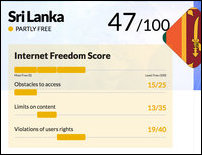Sirisena's ‘Sri Lanka’ with biggest decline in Internet freedom in 2018
[TamilNet, Friday, 02 November 2018, 23:07 GMT]
Internet freedom declined dramatically in ‘Sri Lanka’ in 2018 following major restrictions to connectivity and social media platforms during communal violence in March, says a comprehensive global study of internet freedom in 65 countries. The study was carried out by the Washington DC based Freedom House, which said its study covered 87 per cent of the world’s internet users. Of the 65 countries assessed, 26 have been on an overall decline since June 2017, compared with 19 that registered net improvements. The biggest score declines took place in Egypt and Sri Lanka, followed by Cambodia, Kenya, Nigeria, the Philippines, and Venezuela, the report said.
Internet penetration in Sri Lanka has continued to increase in recent years, but there remains a digital divide between urban and rural areas, the report said and added: “Regulatory reform is needed to ensure independence and transparency, as Sri Lanka’s Telecommunications Regulatory Commission continues to operate under the authority of President Sirisena”. “An atmosphere of political instability prevailed following the local government elections in February. The newly formed Sri Lanka Podujana Peramuna, which includes former President Mahinda Rajapakse among its membership, received 44.65 percent of the vote, indicative of growing factionalism within the ruling coalition2 and the electorate’s dissatisfaction with the government’s performance since it was elected in 2015.” “Hate speech—both online and offline—continues to be a pressing concern, and senior ministers have commented on the need to curb content that promotes ethnic hatred and potentially incites violence. In the aftermath of the violence in Digana, there were additional discussions about regulating social media,” the report further said. India leads the world in the number of internet shutdowns, with over 100 reported incidents in 2018 alone.
External Links:
|







